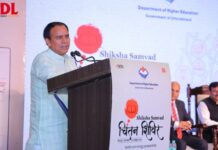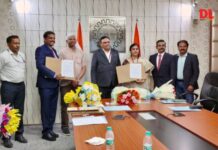Education moves a step Ahead in Banglore
Manipal Education and Medical Group (MEMG) will now provide end-to-end education solutions and other services through Manipal K-12 Education India, formed jointly with TutorVista.com, an online tutoring company. The venture will also provide management services to existing and new schools under the brand Manipal Schools, as well as ICT-based tutorial service. 'A third of India's population is below 15 years. By 2025, India is expected to have the highest youth population. We must ensure they are educated at par with global standards,' CEO of MEMG Ranjan Pai said.
CEO of Manipal K-12 Education India, Meena Ganesh said, the urban-rural divide is visible in schools too. The venture will use a combination of quality teaching inputs and technology to help students as well as improve skills of teachers.
ICTs and capacity building in Open Learning
IGNOU has its presence in more than 35 countries, as of now. The Pan-African tele-education & tele-medicine initiative of Government of India, which shall connect all 53 African Union member states through a satellite, fibre optic and wireless networks, should be seen as an effort towards capacity building across cultures.
The network will connect five universities – two in India and three in Africa – to 53 learning centres for tele-education and 10 super-speciality hospitals in India and Africa to 53 remote hospitals for tele-medicine. The main objective of the tele-medicine network will be to share the knowledge of Indian medical professionals with their African counterparts through on-line training programmes for nurses, paramedical staff and other health workers.
Schools must adopt free software
Schools must teach the concept of free software and let children learn with them, said Richard M Stallman, the founder for Free Software Forum (FSF). Stallman is widely regarded as the father of free software movement. Addressing a gathering in Banglore organised by Swatantra – Samudaya – Swadeshi Software for Suvarna Karnataka, he said children should have access to the source code, the basic programme of the software which would provide them an opportunity to practically learn the working of a software.
He lauded the Kerala government's initiative to introduce free software at schools in a phased manner and the Karnataka government's decision to follow suit.
Higher Education to be strengthened by Government
Minister of State for Human Resource Development (HRD) D. Purandeswari said in a statement in the Lok Sabha, 'One of the critical factors affecting the quality of universities and institutions imparting higher education, is our inability to attract and retain young and talented persons to the teaching profession, leading over a period of time to shortage of teachers in central as well as state universities and other higher educational institutions.'
Explaining the important features of the revised pay scales and service conditions for teachers, Purandeswari said, 'No one shall be eligible to be appointed, promoted or designated as professor unless he or she possesses a Ph.D. and satisfies other academic conditions, as laid down by the University Grants Commission (UGC).' 'This shall, however, not affect those who are already designated as professor,' she added.
75 B.Ed institutions blacklisted by Bihar Government
The Government of Bihar has blacklisted 75 B.Ed institutions in India and Nepal to check a fake degree racket and irregularities in the teacher recruitment drive for government-run schools, official sources said. Bihar Human Resource Development Minister Hari Narayan Singh said the state government was forced to blacklist the B.Ed institutions to check irregularities in appointment of school teachers, reports IANS. 'It will help government agencies to identify fake degrees,' he said.
The degrees issued by these institutions were neither recognised by
the state government nor the National Council of Teachers Education. 'The government has circulated a list of such blacklisted institutions to all district level officials and directed them to immediately forward it to officials involved in recruitment of teachers at sub-division, block and panchayat level for scanning the applications,' Singh said.
Inclusion in School system
Minister of State for Human Resource Development (HRD) D. Purandeswari said during question hour in the Rajya Sabha, 'Inclusiveness is the cornerstone of our educational system and no child, even those that need special attention and special education, will be left out.' She was replying to a supplementary from Jaya Bachchan (Samajwadi Party) on the additional measures being taken for differently- abled children.
Purandeswari noted that under the
Sarva Shiksha Abhiyan (SSA), teachers were being sensitised 'not to segregate such children,' even as she 'pleaded' with the parents of such children to provide adequate support at home. SSA is an effort to universalise elementary education by community-ownership of the school system. It is also an attempt to provide an opportunity for improving human capabilities to all children, through provision of community-owned quality education in a mission mode, Purandeswari pointed.
Kalam wants IISc among world's top 10 institutes
Former president A P J Abdul Kalam has tasked the century-old Indian Institute of Science (IISc) to work towards ranking among the world's top 10 institutes by 2030. 'In the second century of its existence, I want to see IISc rated as one of the top 10 science and technology institutes in the world by 2030,' Kalam said while inaugurating the institute's centenary conference in its green campus. 'As the country's premier science institute, I have a lot of expectations from its faculty and students over the next two-three decades,' he added.
The faculty and students should focus on sustaining rural development, find techniques to increase food production, discover vaccination to treat malaria, HIV and cancer, develop genetically modified seeds for ushering the second green revolution and design, develop and produce hyper-planes and 90-seater jet aircraft, Kalam pointed out.
PM worried over talented youth ignoring Science
Prime Minister Manmohan Singh has expressed concern over talented youngsters giving less priority to science and 'gravitating to other disciplines,' affecting India's competitive edge in the long run. 'It is a fact that in recent years, the talented youth of the country are gravitating to other disciplines than science. Science is no longer necessarily the career of choice of the meritorious students,' Manmohan Singh said after inaugurating a special scholarship programme to retain and attract talent to scientific research.
The Prime Minister had announced the programme at the Indian Science Congress in January. Called Inspire (Innovation in Science Pursuit for Inspired Research), the programme is an initiative of the Science and Technology Ministry and targets one million students and teachers in the next few years.
Manipal Education buys out Antigua University
In one of the biggest cross-border deals in the education space, Manipal Education has acquired the entire shareholding of American More Pictures. University of Antigua (AUA) from New York-based Greater Caribbean Learning Resources. Sources said the company has raised $115 million debt financing from ICICI Bank in recent weeks, which will be ploughed into the buyout as well as capex requirements for ramping up the campus.
The Caribbean is a well-established market for medical students from the US mainland, where the availability of seats far outstrips demand. 'We have completed the buyout, giving us control over AUA, which is among the top five medical education campuses in the Caribbean islands along with St George's University School of Medicine and Ross University,' Anand Sudarshan, MD & CEO, Manipal Education, said.
'We saw a huge potential and strategic value in the acquisition as the Caribbean serves the unmet demand for medical seats in the US. The US is estimated to have 16,800 medical seats, while there are over 60,000 students who clear MCAT annually,' Mr Sudarshan added.
Global slowdown has not affected growth of science in India
C.N.R. Rao, who heads the Science Advisory Council to the Prime Minister, at a special session on nanotechnology said, 'Science and technology has done well and shown steady growth despite economic slowdown in the country. For instance, many positive developments have taken place in the field of nanotechnology because of young scientists evincing great interest in research and development (R&D).' Projecting bright prospects in nanotechnology, he said, large-scale applications are waiting to happen in the emerging field that would have a direct bearing on the quality of life, healthcare and material sciences.
Cautioning students to beware of institutions offering Master's degree in the specialised field, Rao said since nanotech was still in a nascent stage in India, a Master's degree in the subject was far-fetched. He suggested that colleges and university departments should continue to focus on basic sciences so that students with exceptional interest and talent in the field could prepare for a career in nanotechnology.
Gujarat University shifts to semester system
Work has begun on the decision to introduce semester system in the arts, science and commerce faculties of Gujarat University, going by decision taken in the latest academic council meeting. So far, GU used to follow the annual exam mode.
At a meeting, various faculty directors of the university agreed to accept the decision and have started a ground survey on which will be the best system to adopt. The directors' concerns include increase in the number of subjects and the faculty that will be needed.
Director of the faculty of arts, Dr Vasat Bhatt, said, 'Semester system is the need of the hour to make our students more competent in the outside world. All faculty heads are open to the idea.' The faculty of arts, by their own initiative, have even asked for details and syllabus from various universities where semester system is running already. Some of these universities are Pune University, SNDT, JNU, Vikram Vishwavidyalay and Saurashtra University. The report of the same has been submitted to the Vice Chancellor.' The faculties are hoping to launch the semester system by the next academic year 
 When dealing with education, across all ages, the basic necessity is to accept that the child is ahead of us in this digital age. We need to make an effort to catch up with youth, periodically, and give them what they need. Parenting and education are both very traditional; they both resist change. There is a common pitfall for both: you and I know 'everything'; we feel that we know exactly what our child needs and set about providing for that need, as we perceive it. We take that perceived need for granted, while dealing with children and rural society.
When dealing with education, across all ages, the basic necessity is to accept that the child is ahead of us in this digital age. We need to make an effort to catch up with youth, periodically, and give them what they need. Parenting and education are both very traditional; they both resist change. There is a common pitfall for both: you and I know 'everything'; we feel that we know exactly what our child needs and set about providing for that need, as we perceive it. We take that perceived need for granted, while dealing with children and rural society.










 Never had the world looked smaller before the advent of the World Wide Web. The Internet has brought about a revolution in the way information is construed, passed and perceived. With its proven benefits in the field of corporate and governance across the world, it is time for us to witness an Internet revolution in the field of education as well.
Never had the world looked smaller before the advent of the World Wide Web. The Internet has brought about a revolution in the way information is construed, passed and perceived. With its proven benefits in the field of corporate and governance across the world, it is time for us to witness an Internet revolution in the field of education as well. 

 Our education system continues to be enmeshed in a paradigm where notes accumulation and reproduction of information is equated with learning and mere memorisation. The system today equips students with factory like efficiency where in doing well in the school exam drives everything. The output, the system thrives on churning out standardised children like graded products in a factory, weak in reasoning and thinking. But then where is the disconnect in the system?
Our education system continues to be enmeshed in a paradigm where notes accumulation and reproduction of information is equated with learning and mere memorisation. The system today equips students with factory like efficiency where in doing well in the school exam drives everything. The output, the system thrives on churning out standardised children like graded products in a factory, weak in reasoning and thinking. But then where is the disconnect in the system? 
 To enable students to be more interactive and engaged, Plus Business Machines Ltd introduces a portable attachment for any ordinary white board which converts it into Interactive white board. It comes with various options such as Capture kit and Wireless kit to enhance effectiveness of teaching. Mimio Interactive + Capture combine the features of Mimio Interactive and the Mimio Capture kit to provide a complete Interactive Whiteboard and note capture system.
To enable students to be more interactive and engaged, Plus Business Machines Ltd introduces a portable attachment for any ordinary white board which converts it into Interactive white board. It comes with various options such as Capture kit and Wireless kit to enhance effectiveness of teaching. Mimio Interactive + Capture combine the features of Mimio Interactive and the Mimio Capture kit to provide a complete Interactive Whiteboard and note capture system. 








